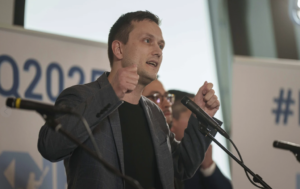Liang Wenfeng, the 40-year-old founder of DeepSeek, an AI startup that has made waves by challenging industry giants like OpenAI, has kept a relatively low profile while building his business empire. Originally from Guangdong in southern China, Liang studied in Zhejiang province, which is home to major tech companies like Alibaba.
Before founding DeepSeek in 2023, he set up a hedge fund in 2015 called High-Flyer Quantitative Investment Management. The fund initially focused on computerized stock trading models and gradually incorporated machine learning to improve those strategies.
Although High-Flyer faced setbacks when Chinese regulators clamped down on quantitative trading last year, it continues to manage $8 billion in assets, providing sufficient resources to fuel DeepSeek’s AI research and development.
By 2022, High-Flyer had accumulated a powerful computing setup, including a cluster of 10,000 high-performance A100 graphics processing units (GPUs) from California-based Nvidia, which are essential for building and running AI systems. This information was shared in a post on the Chinese social media platform WeChat. However, shortly after, the U.S. imposed restrictions on the sale of these chips to China.
In 2023, Liang Wenfeng expressed confidence in DeepSeek’s ability to succeed in the AI field, stating that they were not only certain but also well-equipped to take on the challenge. He noted that neither major tech companies nor startups had a clear, unbreakable advantage in the AI race. He also pointed out that with OpenAI setting the stage, the field is open, with many relying on published research and open-source code.
Liang mentioned that his daily routine involves reading research papers, coding, and engaging in discussions with other researchers. He added that DeepSeek’s work is focused on exploring the concept of intelligence itself.
Liang Wenfeng explained that DeepSeek’s pursuit of AI development is primarily fueled by curiosity, rather than any hidden business strategy. When the AI model was asked about his background, it mistakenly identified another Chinese entrepreneur with the same name. Additionally, when asked about Liang’s place of origin or education, the AI could not provide any details, acknowledging that no public information was available as of its most recent knowledge cutoff in October 2023.
Liang’s approach reflects his dedication to advancing AI research. He believes that after decades of relying on Western innovation, China should now be contributing more to the field. He emphasized that Chinese AI cannot continue to merely follow the lead of others. According to him, the true gap isn’t just one or two years behind the U.S. but rather the difference between originality and imitation. He argues that without original exploration, China will remain a follower in AI development.













